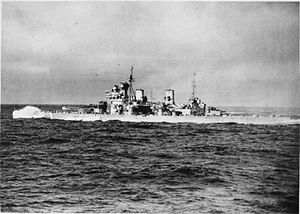HMS Duke of York (17)

HMS Duke of York in March 1942, while escorting Convoy PQ 12
|
|
| History | |
|---|---|
|
|
|
| Name: | HMS Duke of York |
| Namesake: | George VI (previously the Duke of York) |
| Ordered: | 16 November 1936 |
| Builder: | John Brown and Company, Clydebank, Scotland |
| Yard number: | 554 |
| Laid down: | 5 May 1937 |
| Launched: | 28 February 1940 |
| Commissioned: | 4 November 1941 |
| Decommissioned: | November 1951 |
| Struck: | 18 May 1957 |
| Identification: | Pennant number: 17 |
| Fate: | Scrapped in 1957 at Shipbreaking Industries, Ltd., Faslane, Scotland |
| General characteristics | |
| Class and type: | King George V-class battleship |
| Displacement: | 42,076 long tons (42,751 t) deep load |
| Length: |
|
| Beam: | 103 ft 2 in (31.4 m) |
| Draught: | 34 ft 4 in (10.5 m) |
| Installed power: | 110,000 shp (82,000 kW) |
| Propulsion: | |
| Speed: | 28.3 knots (52.4 km/h; 32.6 mph) |
| Range: | 15,600 nmi (28,900 km; 18,000 mi) at 10 knots (19 km/h; 12 mph) |
| Complement: | 1,556 (1945) |
| Sensors and processing systems: |
|
| Armament: |
|
| Armour: |
|
| Aircraft carried: | 4 × Supermarine Walrus seaplanes |
| Aviation facilities: | 1 × double-ended catapult (removed early 1944) |
HMS Duke of York was a King George V-class battleship of the Royal Navy. Laid down in May 1937, the ship was constructed by John Brown and Company at Clydebank, Scotland, and commissioned into the Royal Navy on 4 November 1941, subsequently seeing combat service during the Second World War.
In mid-December 1941, Duke of York transported Prime Minister Winston Churchill to the United States to meet President Franklin D. Roosevelt. Between March and September 1942 Duke of York was involved with convoy escort duties, but in October she was dispatched to Gibraltar where she became the flagship of Force H.
In October 1942, Duke of York was involved in the Allied invasion of North Africa, but saw little action as her role only required her to protect the accompanying aircraft carriers. HMS Duke of York stopped the Portuguese vessel Gil Eannes on 1 November 1942 and a commando arrested Gastão de Freitas Ferraz. The British had picked up radio traffic indicating naval espionage, possibly compromising the secrecy of the upcoming Operation Torch.
After Operation Torch, Duke of York was involved in Operations Camera and Governor, which were diversionary operations designed to draw the Germans' attention away from Operation Husky, the invasion of Sicily. On 4 October, Duke of York operated with her sister-ship Anson in covering a force of Allied cruisers and destroyers and the American carrier Ranger,during Operation Leader, which raided German shipping off Norway. The attack sank four merchant ships and badly damaged a further seven.
...
Wikipedia
